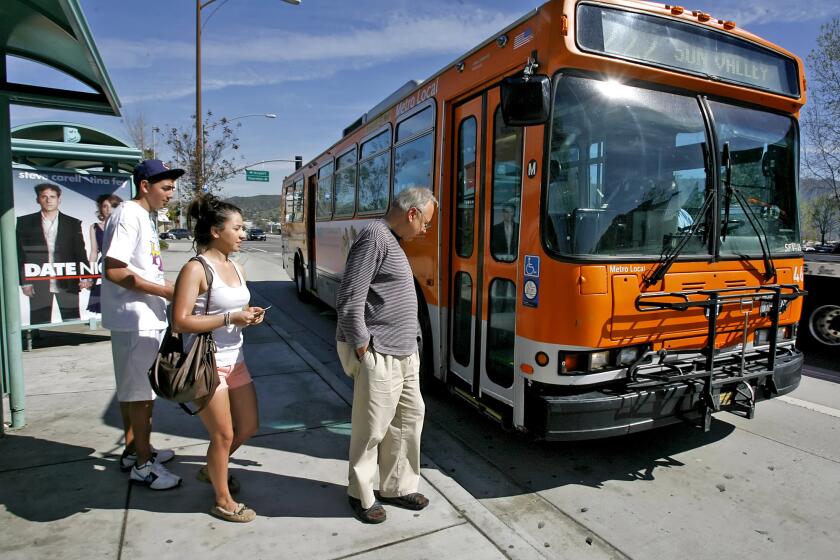Delta’s CEO Emerges as Industry Voice
When airline executives went to Washington this week to beg for a multibillion-dollar rescue plan, they turned primarily to one boss to plead their case: Leo F. Mullin, Delta Air Lines’ chairman and chief executive.
Mullin responded with a calm yet resolute appeal: His industry must have the help to survive the drop in airline traffic that’s followed last week’s terrorist attacks; the prospects for countless related businesses--and their employees--hang in the balance.
“Airline service is the backbone of our economy,” he told the House Transportation Committee, before which he appeared this week with several aviation executives but fielded most of the lawmakers’ questions. Referring to the rescue package’s $5 billion in direct aid, he said: “Make no bones about it. That $5 billion is needed right now.”
That Mullin is leading the airlines’ crusade is not without irony, because until four years ago he had never worked for an airline. With a Harvard MBA, he spent most of his career as a banker at First Chicago Corp., and that background makes him ideally suited for seeking financial help as the airlines deal with their worst crisis.
As head of Atlanta-based Delta, the nation’s third-largest airline, Mullin also was the logical choice to lead the airlines’ cause in place of the CEOs of the two largest U.S. carriers: Donald Carty of American Airlines and its parent, AMR Corp., and James Goodwin, his peer at United Airlines and its parent, UAL Corp. Those airlines’ jets were hijacked and used in the suicide attacks, so the two executives also are having to grapple with the loss of their passengers and crews.
Mullin, 58, already is known as one of the most astute and capable airline CEOs in the business. “He has the stature of [retired American Airlines chief] Robert Crandall,” one of the industry’s most renowned chiefs, said Ron Kuhlmann, vice president at Roberts, Roach & Associates, an aviation consulting firm in Hayward, Calif.
But Mullin “has the ability to communicate that some others don’t” when it comes to gaining support for his initiatives, even though he prefers to keep a low public profile, Kuhlmann said.
Mullin also played a key role in assembling the rescue package and the financial and operating data required to persuade Congress and the Bush administration to help the carriers, according to people close to the effort.
He’s also had to deal with most of the tough questions from lawmakers, who cited the industry’s growing layoffs and its million-dollar executive compensation packages for giving them second thoughts about rescuing the airlines.
Delta, like its rivals, is slashing its permanent flight schedule by 20% and next week will initiate job cuts because there is “absolutely no alternative,” Delta President Frederick Reid told workers Thursday.
Delta “will do the best we can” for its furloughed workers, Mullin told the House committee. As for industry executives’ pay, he noted that most of their compensation reflects bonuses based on the airlines’ profits or their exercise of options tied to the airlines’ stock prices, and that both the profits and the stocks have tumbled.
(Mullin’s annual base salary is $795,000; last year he also received a $1.4-million bonus. He has stock options as well.)
Delta Air Lines itself was in considerable pain in 1997 when it dumped its chief executive and, for the first time in the airline’s history, reached outside its headquarters for a CEO and hired Mullin.
The airline had seen its once-glittering service erode, and employees’ morale was sinking in the face of massive cost-cutting by Mullin’s predecessor, Robert Allen. Though Allen had restored Delta’s profitability after huge losses in the early 1990s, Delta’s earnings and revenue growth began to languish again before Mullin arrived.
Mullin, in fact, was one of a breed of new managers who came to the airlines in the 1990s with a renewed focus on increasing profit, not just gaining market share at any cost.
Known as a brainy yet engaging and personable executive, Mullin started his career as a partner with management consulting firm McKinsey & Co. Then he spent five years as chief strategist at Conrail, where he was credited with helping the railroad turn from a loss to a profit.
He moved to First Chicago in 1981 and eventually became president and chief operating officer. But Mullin lost his chance at the top job when First Chicago was acquired by NBD Corp. in 1995.
So Mullin became vice chairman of Chicago-based Commonwealth Edison (now part of Exelon Corp.), where he stayed until Delta called.







